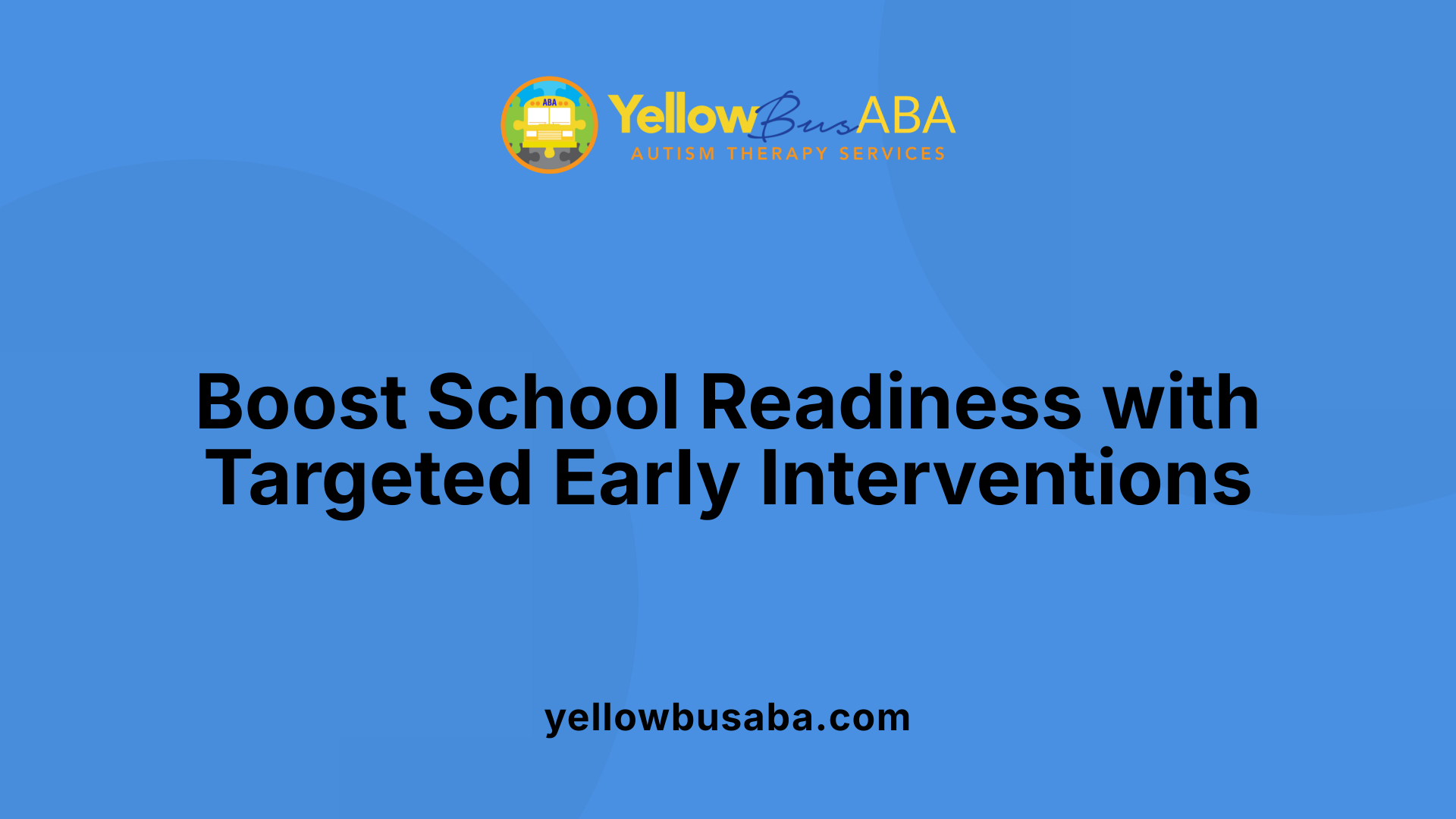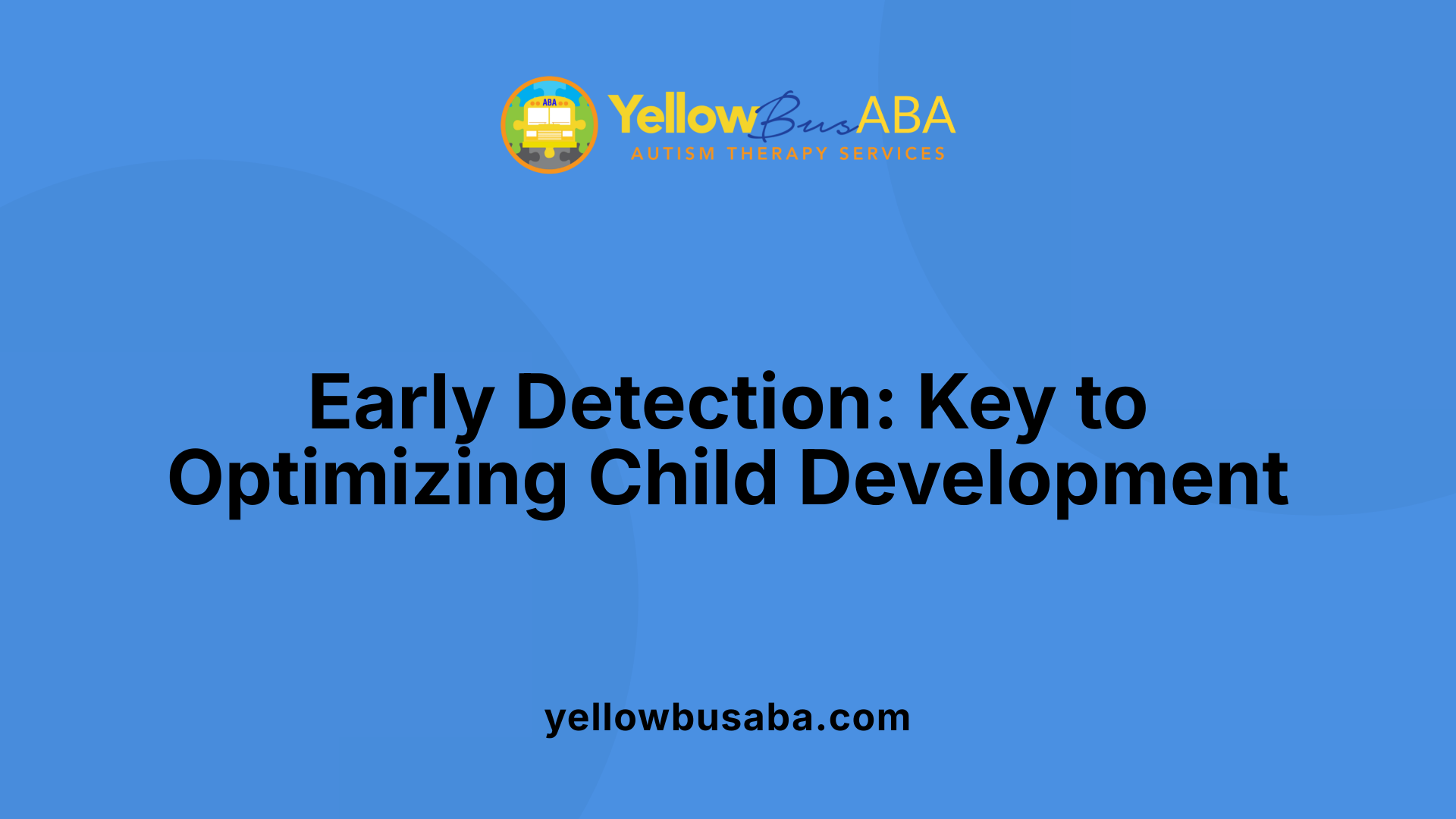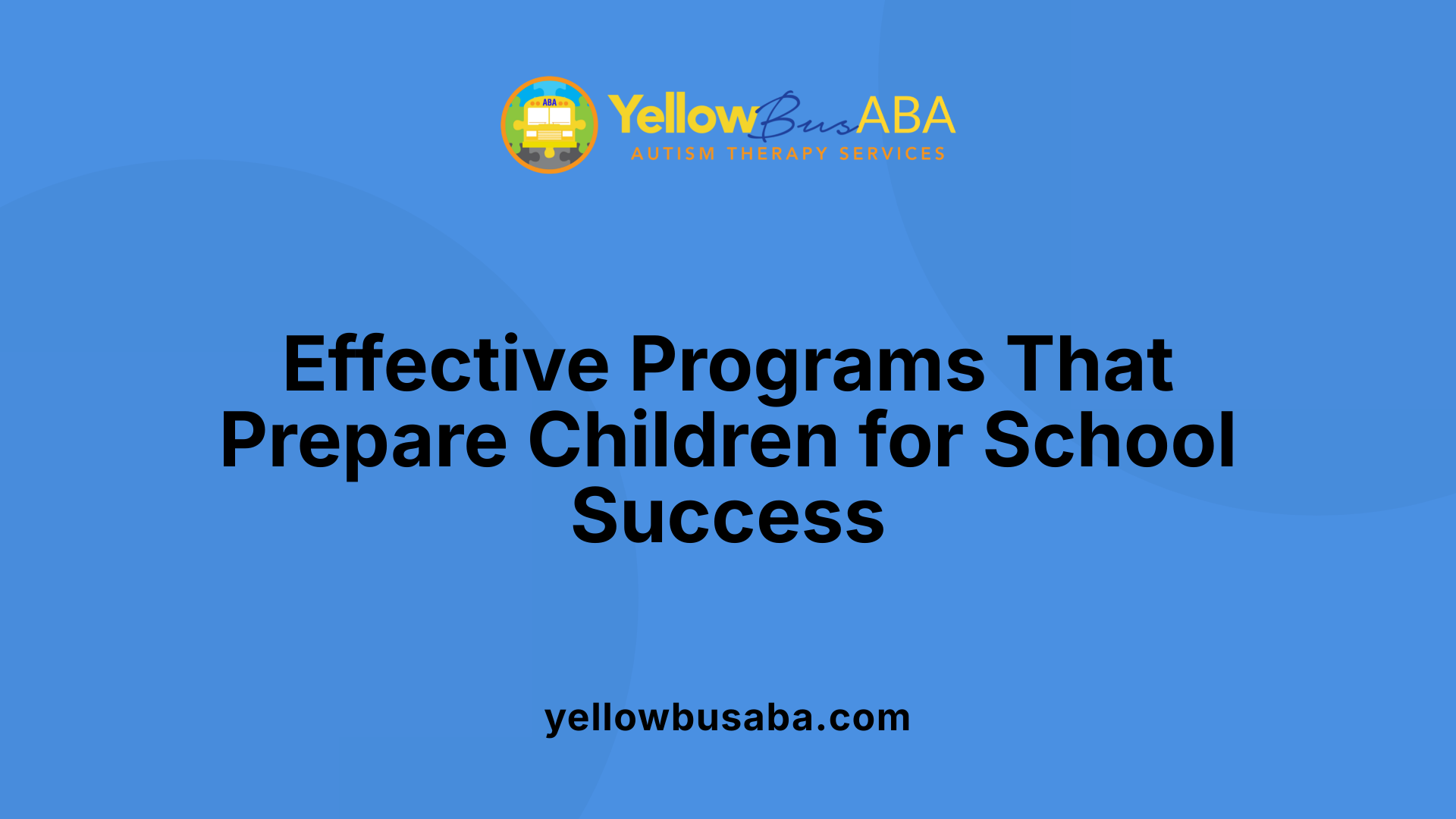The Critical Role of Early Support in Child Development
Early intervention programs are vital for preparing children to succeed academically, socially, and emotionally. By addressing developmental needs during the crucial early years, these programs foster lifelong skills that set the stage for future achievement. This article explores how early intervention enhances school readiness, the mechanisms behind its effectiveness, and the strategies that ensure children develop the competencies necessary for a successful educational journey.
Understanding the Benefits of Early Intervention Programs

What are the benefits of early intervention programs in developing school readiness skills?
Early intervention programs play a vital role in shaping a child's future by fostering essential skills needed for academic and social success. These programs focus on developing social, emotional, cognitive, and motor skills during the critical early years, particularly within the first five years of life when the brain exhibits high plasticity. Activities such as speech therapy, occupational therapy, and family support services help children reach important developmental milestones.
A significant benefit of early intervention is its ability to strengthen positive parent-child interactions and classroom engagement. When parents and teachers are trained and equipped with evidence-based tools like visual prompts, modeling, routines, and praise, children gain a strong foundation for learning and emotional regulation.
Programs like The Incredible Years and others emphasize building social-emotional literacy, behavioral management, and self-regulation skills. These aspects prepare children not only for school success but also for lifelong resilience. For instance, improved social skills and emotional regulation can reduce the risk of anxiety, depression, and behavioral disorders later in life.
Leverage of brain plasticity during the early years makes these interventions particularly effective. Research indicates that early cognitive, language, and motor development are more readily shaped in this period, leading to better academic outcomes and lower likelihood of requiring special education later on.
In addition to developmental benefits, early intervention has been associated with significant long-term positive outcomes, including higher employment rates, increased earnings, and greater independence in adulthood. Overall, investing in early intervention reduces future educational costs, promotes well-being, and creates a strong foundation for children’s lifelong success.
What is the importance of early intervention in reducing the need for special education?
Early intervention services help identify and address developmental delays or disabilities at an early stage. By providing targeted therapies and support, these programs can mitigate the severity of developmental challenges, allowing children to develop skills closer to typical age ranges.
Research from various sources shows that children who receive early intervention are less likely to need intensive special education services as they grow older. In fact, about one-third of infants and toddlers receiving early support did not have a disability when entering kindergarten.
By addressing issues early, children can achieve greater independence and educational success. This reduces the burden on special education systems and enables more children to succeed in mainstream classrooms. Furthermore, early support can prevent secondary emotional or behavioral problems, promoting overall mental health and social integration.
How do early interventions lead to long-term benefits such as higher employment and earnings?
The benefits of early intervention extend into adulthood. Children who receive early developmental support tend to perform better academically, graduate at higher rates, and pursue higher education. Improved cognition, social skills, and emotional regulation promote better job prospects.
Longitudinal studies show that individuals who benefited from early intervention have higher employment rates, greater self-sufficiency, and earn more over their lifetimes compared to those who did not receive such support. These long-term outcomes reflect the importance of nurturing essential skills early on, setting the stage for success in various aspects of life.
Overall, early intervention is a powerful strategy that not only enhances immediate developmental outcomes but also contributes to lifelong socio-economic stability, emphasizing the importance of providing support during the most formative years.
Supporting School Readiness through Early Intervention Strategies

How do early intervention programs support school readiness?
Early intervention programs are vital for preparing children to succeed in school. They focus on developing fundamental skills in language, cognition, and social-emotional areas, which are crucial for effective learning. By providing targeted services like speech therapy, occupational therapy, and behavioral support, these programs help children meet developmental milestones and adapt to classroom environments.
Research shows that children who participate in early intervention are more likely to enter kindergarten with strong skills, close achievement gaps, and require fewer special education services later on. Additionally, programs such as The Incredible Years and Family Check-Up empower parents and teachers with strategies to promote social-emotional learning and behavioral regulation, further enhancing school readiness.
Theory and evidence confirm that early intervention leverages brain plasticity during the earliest years, making this window optimal for skill development. When children receive the right support at the right time, they build resilience and confidence, setting a foundation for lifelong learning.
Developmental domains targeted by early intervention (language, cognition, social-emotional skills)
Early childhood intervention primarily targets three core domains: language, cognitive, and social-emotional skills. Language development, including vocabulary and literacy, is closely linked to future academic achievement.
Cognition involves problem-solving, memory, and attention, underpinning learning abilities. Social-emotional skills encompass emotional regulation, social interactions, and self-control, which are vital for classroom behavior and peer relationships.
Programs like The Incredible Years enhance these domains through activities like storytelling, role-playing, and structured play, which foster early literacy, reasoning, and emotional self-management. Occupational therapy and speech therapy support children in building fine motor and language skills essential for school success.
Importance of early screening and family involvement
Timely identification of developmental delays through screening is critical to initiating effective early intervention. Pediatricians often play a key role in early screening for issues like speech delays, autism, or motor difficulties, ensuring children receive support as soon as potential concerns arise.
Family involvement is a cornerstone of successful early intervention. Programs like the Family Check-Up focus on improving positive parent-child interactions, which directly influence children’s social and academic skills. Engaging families in activities such as reading, talking, and singing nurtures brain development and reinforces learning at home.
Research consistently shows that higher levels of positive engagement and self-regulation at home correlate with improved academic skills by age 5. Support and education for parents regarding developmental milestones foster a nurturing environment conducive to school readiness.
Role of evidence-based programs like The Incredible Years and Family Check-Up
Evidence-based programs such as The Incredible Years and Family Check-Up are proven to effectively promote early development and school preparedness.
The Incredible Years offers parent and teacher training that improves behavior management, social skills, and emotional regulation. These programs include visual prompts, modeling, and routine to help children meet developmental milestones.
The Family Check-Up emphasizes family-centered strategies, boosting positive parenting, and child self-regulation. Studies indicate children in these programs show measurable improvements in language, social behavior, and emotional skills.
Implementing these structured, research-backed programs universally can help bridge achievement gaps and support children from diverse backgrounds, especially those at risk due to socioeconomic factors.
| Program Name | Focus Area | Main Strategy | Long-term Impact |
|---|---|---|---|
| The Incredible Years | Social-emotional and behavioral skills | Parent/teacher training, visual prompts | Reduces behavioral issues, enhances school readiness |
| Family Check-Up | Family engagement, self-regulation | Family-centered coaching, positive parenting | Improves language, social skills, and reduces conduct problems |
| Head Start | Overall school readiness | Comprehensive early childhood education | Gains in vocabulary, early writing, but some effects fade over time |
Investing in and expanding access to high-quality early intervention programs is essential for fostering a generation of children ready to succeed academically and socially.
Effective Approaches to Enhance School Readiness
Routine establishment and independence skills
establishing consistent daily routines is fundamental for preparing children for the structure of school. Routines provide a sense of security and predictability, helping children understand what to expect and how to behave in various settings. Developing independence in self-help skills, such as dressing, feeding, and bathroom routines, boosts confidence and fosters autonomy. Children who are capable of managing simple tasks are more prepared to handle classroom expectations and transitions.
Play-based learning and social skill development
Engaging children in play-based activities promotes social, emotional, and cognitive development. Play fosters skills like cooperation, communication, and problem-solving, which are vital for school success. Structured play exercises, storytelling, and shared activities help children learn to navigate peer interactions, regulate emotions, and develop language skills. Early language development, both receptive and expressive, is crucial for academic progress, and play provides an ideal context for nurturing these skills.
Home–center collaboration and parental engagement
Strong collaboration between families and early childhood programs enhances school readiness. When parents participate in orientation sessions, communicate regularly with teachers, and engage in shared activities, children benefit from consistent reinforcement of learning and social skills at home and school. Parental involvement supports language growth, behavioral regulation, and positive attitudes towards learning. Programs like the Incredible Years and Family Check-Up facilitate this partnership by empowering parents with strategies to support their child’s development.
| Strategy | Description | Impact |
|---|---|---|
| Routine establishment | Creating consistent daily schedules | Provides structure, enhances security, promotes independence |
| Play-based activities | Using play to teach social, emotional, and cognitive skills | Fosters communication, problem-solving, social competence |
| Parental engagement | Active involvement of families in education and routines | Reinforces learning, improves behavioral outcomes |
Research supports that implementing these approaches leads to better school transition, improved social-emotional skills, and a solid foundation for lifelong learning. By focusing on routines, play, and parent–teacher collaboration, early childhood programs can significantly boost children's readiness, setting them on a successful educational path.
The Importance of Early Detection of Developmental Delays and Disabilities

Why is early detection and intervention important for children with developmental delays or disabilities?
Early detection and intervention play a crucial role in supporting children with developmental delays or disabilities. During the first three years of life, the brain is highly plastic, meaning it is especially responsive to environmental influences and therapeutic interventions. Recognizing developmental challenges at this critical period allows for timely access to targeted services such as speech, occupational, behavioral, and physical therapies.
These early interventions help children meet essential milestones, improve their cognitive skills, and foster social and emotional development. For example, speech therapy can support language growth, while occupational therapy may improve fine motor skills and self-care abilities. Engaging families through family-centered approaches enhances the support network at home and encourages positive interactions that bolster overall development.
By addressing developmental delays early, children are better prepared for school, with higher chances of succeeding academically and socially. Moreover, early intervention can reduce the likelihood of requiring intensive special education services later in life, leading to better long-term outcomes.
Research consistently shows the profound impact of early detection. When children receive support during these sensitive periods, their developmental trajectory can be markedly improved. Families also feel empowered by understanding their child’s needs early, which reduces stress and promotes a healthier family environment.
In essence, early detection acts as a foundation for lifelong success. It ensures children grow up with the skills necessary to reach their full potential and leads to more positive futures for children with developmental delays or disabilities.
Long-Term Advantages of Early Intervention

What are the long-term outcomes of early intervention on educational achievement and lifelong success?
Early intervention programs have profound effects that extend far beyond early childhood. One of the most notable benefits is the improvement in educational achievement. Children who participate in high-quality early intervention are more likely to enter kindergarten with essential skills such as language, self-regulation, and social competence. This preparedness significantly increases their chances of academic success, reduces the likelihood of grade repetition, and promotes continued learning.
Research indicates that these interventions foster foundational social-emotional skills, which are vital for classroom engagement and peer relationships. Developing strong social and emotional resilience helps children manage stress, adapt to new environments, and engage constructively with teachers and classmates.
Long-term outcomes include better performance in elementary and secondary education, higher graduation rates, and increased opportunities for higher education and employment. For example, children who start early and remain engaged tend to achieve higher incomes as adults and demonstrate greater independence.
A comprehensive, team-based approach is used to monitor and support each child's development, aligning goals with family aspirations. Data collected during the intervention show that the improvements are functional and meaningful, supporting participation in routines at home, in school, and in the community.
Family involvement is critical, as it enhances the child's progress and empowers parents with knowledge and advocacy skills. This collaborative model ensures that long-term success is rooted in tailored support that considers each child's unique strengths and needs.
In summary, early intervention not only boosts immediate developmental skills but also sets the stage for enduring benefits—educational excellence, career readiness, and resilient social-emotional health—ultimately shaping brighter futures for children across their lifespan.
Contributions of Specific Early Intervention Programs to School Readiness

How do specific early intervention programs contribute to school readiness?
Early intervention programs play a vital role in preparing children for academic success by fostering essential social, emotional, and behavioral skills. These skills form the foundation for effective learning, positive peer relationships, and emotional resilience.
Programs like The Incredible Years focus on enhancing social-emotional competencies, behavioral management, and empowering parents. These interventions facilitate positive parent-child interactions and effective classroom management, leading to improved social skills and emotional regulation.
The Family Check-Up (FCU) program emphasizes strengthening parent–child relationships by increasing positive engagement and self-regulation. Research indicates that children whose parents participate in FCU show improvements in academic skills from ages 5 to 8.5, highlighting the impact of early family-focused strategies.
For children with autism, Applied Behavior Analysis (ABA) therapy targets core skills such as communication, social interaction, and adaptive behaviors like dressing and eating. The structured routines and activities in ABA support children in generalizing skills to classroom settings, easing their transition into school.
Beyond behavioral and social skills, interventions also enhance language, literacy, and numeracy. High-quality early childhood education introduces children to pre-academic concepts through language-rich environments, structured play, and instruction in foundational skills like early reading and math.
Evidence from large-scale studies shows that participation in evidence-based programs improves vocabulary, early writing, and math skills, which are crucial for school readiness. Starting these programs early and maintaining consistent engagement typically lead to better outcomes.
Overall, these programs contribute to higher rates of kindergarten entry with the necessary skills, help close achievement gaps—especially for children from low-income backgrounds—and promote a smooth transition into formal education.
| Program Type | Focus Area | Outcomes | Additional Notes |
|---|---|---|---|
| The Incredible Years | Social-emotional skills, behavioral management | Improved social skills, emotional regulation | Empowers parents and teachers, supports classroom and home environments |
| Family Check-Up | Parent-child interactions, self-regulation | Increased academic skills, reduced behavioral problems | Benefits most for children in low-income families |
| ABA Therapy | Communication, social, adaptive skills | Better social interactions, reduced autism symptoms | Targets children with autism spectrum disorder |
| Preschool/Lit & Numeracy Programs | Literacy and math skills | Better school readiness, higher achievement | Effective when high-quality and sustained |
In summary, targeted early intervention programs build upon children’s developmental strengths, address delays, and foster skills directly linked to successful school transitions and long-term academic achievement.
A Lifelong Investment in Child Success
Investing in early intervention is a strategic approach that builds a robust foundation for children’s academic, social, and emotional development. It reduces disparities, enhances long-term educational and vocational outcomes, and fosters resilience. Recognizing the importance of early detection, high-quality programs, and family involvement ensures children are well-prepared for the challenges of school and life. As research continues to demonstrate, proactive early support not only benefits individual children but also creates a more equitable and prosperous society.
References
- How Early Intervention Improves Academic Success | The IY® Blog
- Exploring the Benefits of Early Intervention: How They Shape ...
- Early Interventions May Boost Academic Skills Among ...
- [PDF] What is Early Intervention and Why is it Important | USU IDRPP
- School readiness: Why early intervention is key
- The Influence of Early Intervention on Academic Success - TEIS, Inc
- Early childhood interventions in educational settings that promote ...






